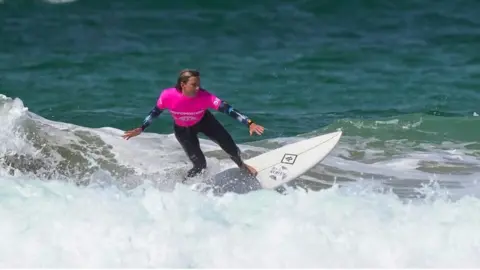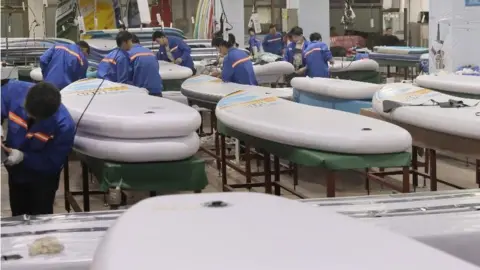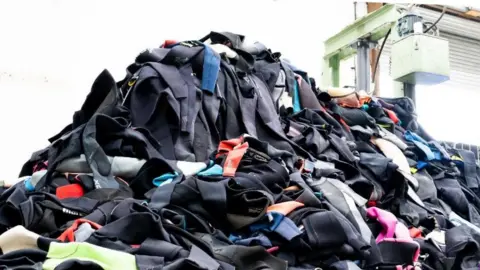Surf champ Lucy Campbell says her sport must be greener
 Getty Images
Getty ImagesA top UK surfer has slammed her sport for relying on boards and wetsuits mass-produced from petrochemicals that create tonnes of waste every year.
Seven times British women's champion Lucy Campbell told the BBC the top brands "need to change".
Despite surfing's eco-friendly image, it uses plastic boards covered in toxic resins and non-biodegradable wetsuits.
The industry says it is developing new sustainable boards and the world's first fully recycled wetsuit.
Ms Campbell said she would now only work with or accept sponsorship from brands with a clear sustainability ethos.
"It's often hard to turn down a big pay cheque, if they're a brand that isn't sustainable, but it's definitely more worthwhile in the long run," she said.
 Getty Images
Getty ImagesShe said there are already examples of how brands can be more sustainable and how they can have less impact on the environment.
"I think that they need to take the onus and make that difference. It may come at a higher price but I think eventually that price will come down as technology advances."
Historically, surfing has had an image of a sport and lifestyle that is in tune with, and protects, oceans and the environment.
But environmental campaigners say the manufacture and export of polystyrene and polyurethane boards and neoprene wetsuits comes with a significant carbon footprint.
One long-standing study estimated the manufacture of a traditional polyurethane board, covered with epoxy resins and exported across the globe, could be responsible for producing the equivalent of up to 250kg of carbon dioxide.
Meanwhile, if you add in the international travel needed to enjoy the best waves, the average surfer's carbon footprint is said to be 50% greater than the average person's.
Lucy Campbell herself is due to compete this month in Olympic-qualifying championships in El Salvador. She tries to offset the carbon cost of her travel, adding: "You do want to encourage people to get outdoors but at the same time at what cost to the planet?"
It has also been estimated that more than 8,000 tonnes of neoprene wetsuits end up in landfill every year.

Surfing's Dirty Secrets - Watch now on BBC iPlayer (UK Only)
Does the world of surfing need to do more to make it a sustainable sport?

Industry body the Surf Industry Members Association said it was proud of the environmental progress being made and that businesses had donated up to $80m (£64m) to the work of environmental organisations.
Vipe Desai, the association's executive director, said businesses were "working together to address the environmental impacts of the products the industry produces. This effort was, and continues to be, driven by consumers demanding surf brands do more."
Greener surfboards and wetsuits
The industry is developing new surfboards made out of recycled material or natural fibres - even mushrooms - and wetsuits made from natural rubber sourced from sustainable plantations.
In the UK, surf company Finisterre is developing a wetsuit made from recycled neoprene suits, which it says would be a world first. It collected nearly 1,000 old suits to create a recycled rubber that they are currently testing.
 Claire Marshall
Claire MarshallTom Kay, the company's founder, said more brands had to invest in developing new ideas.
"Some of the press that's coming out around the toxicity of neoprene is extreme to say the least, horrendous, so if you knew that why wouldn't you change?" he said.
Last summer, Keep Britain Tidy's Ocean Recovery Project collected more than 1,000 discarded body boards on a handful of beaches across the South West.
It says cheap mass-produced boards can release thousands of tiny polystyrene balls into the environment when they break, posing a risk to wildlife.
Project manager Neil Hembrow said the number of dumped boards had been "disheartening".
But the industry says it is trying to become more sustainable and to educate surfers about how they can make their boards last longer.
Mark Dale, the chief marketing officer for Agit Global, a US company that makes the mass-produced board Wavestorm in Taiwan said their boards were not designed to be thrown away after a few uses.
He told the BBC: "The misconceptions about Wavestorm is that we are creating this mass of boards that are meant for landfill, but you can use a Wavestorm board for many years. We don't build boards as disposable boards here."
He added that their manufacturing process had been independently audited and each board made produced the equivalent of just 24kg of carbon dioxide,
Dr Greg Borne, a social scientist at Plymouth Marjon University, said he was hopeful about the industry's efforts to tackle its environmental impact.
He said: "It's a business and they are turning a profit but they are turning a profit now in a way that is starting to consider the sustainability factors."
